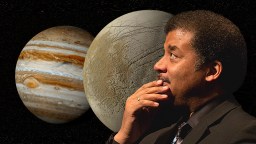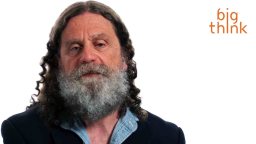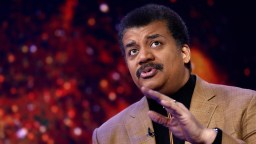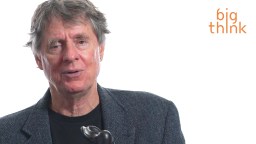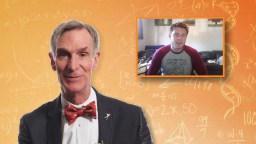Videos
All Stories
There’s a good chance that as you’re reading this you’re somewhat unconscious. Just how much is your brain not telling you? Neuroscientist Dean Buonomano peeks behind the curtain of your own brain.
▸
4 min
—
with
Is it crazy to think that we could one day live forever? Well, yes. Yes it is. But with a few changes to our surroundings, British scientist Geoffrey West thinks that we could perhaps double our lifespan.
▸
13 min
—
with
Should companies provide a ‘Made In an American Prison’ label if the product is made in an American jail?
▸
7 min
—
with
The finance sector often lives up to its bad reputation, but here’s how a 2000-year-old piece of wisdom can help rehabilitate the way people and corporations think about money.
▸
7 min
—
with
As the Internet takes over from broadcast television, we find ourselves in a new psychological ecosystem—and people’s ability or failure to adapt explains the last two years of American politics.
▸
9 min
—
with
High school junior Caitlin is worried. She wants to be a scientist but is struggling with it a little bit in school—is there hope for her career?
▸
2 min
—
with
AI is capable of self-reproduction—should humans be worried?
▸
6 min
—
with
How we remember time is vastly different to how we experience it, says neuroscientist Dean Buonomano.
▸
4 min
—
with
Is our existence base reality—or are we pawns in a matrix? Cognitive scientist Joscha Bach explains how we might be able to tell.
▸
6 min
—
with
Not long ago, most people would probably judge how trustworthy you were based entirely on your physical appearance. Today, we know that kind of thinking is a dangerous pseudoscience.
▸
6 min
—
with
Optimistic people tend to live longer than pessimistic people. That’s true whether you’re rich or poor, young or old, and no matter your race, says sociologist William Magee.
▸
10 min
—
with
What does Robert Sapolsky—an “utter, complete, atheist”—think about the persistence of magical thinking in our modern world?
▸
3 min
—
with
Once we discover alien life out there, humanity will never be the same.
▸
2 min
—
with
Fake news used to be called propaganda, and being politically correct once meant being eloquent. Words change meaning, but there’s still no replacement for good taste, says Garlin.
▸
3 min
—
with
The psychopath gene can be expressed in one of two ways. Here’s what stopped James Fallon’s psychopathy from becoming destructive.
▸
3 min
—
with
Everyone loves Europa, says Neil deGrasse Tyson. Why? It’s a strong bet for finding life in our solar system, and it’s even more amazing because it breaks all the rules.
▸
7 min
—
with
Physics finds no trace of God so far—but does it matter?
▸
2 min
—
with
Your mind is built to process contradictory, irrational ideas. Use that to reach new intellectual heights.
▸
4 min
—
with
Our implicit biases are rooted in biology, but they can be easily manipulated. That’s both really good and really bad.
▸
7 min
—
with
From Abraham Lincoln’s founding of the National Academy of Sciences in 1863, to the US currently leading the world in the Nobel Prize count (a third of which we owe to immigrants), America was built on science. What happens when we doubt and defund it?
▸
12 min
—
with
Our consciousness distinguishes us from other animals. From an evolutionary perspective, consciousness gives humans a powerful advantage by allowing us to plan far into the future.
▸
3 min
—
with
Ideology doesn’t bend to reason, says Professor Barbara Oakley. Here’s why we can’t really change what other people believe, and why that brand of “helping” others can backfire.
▸
5 min
—
with
Ever heard a story that made you sick to your stomach? There is neurological wizardry at work that makes our sense of morality so visceral—and flawed.
▸
5 min
—
with
What information can we trust? Truth isn’t black and white, so here are three requirements every fact should meet.
▸
7 min
—
with
Humans worship at the altar of excellence, but is our complete obsession with this “quality controlled” mode of intellect holding us back?
▸
5 min
—
with
Many people will try to give you hope or sell it to you, says Richard M. Cohen, who was diagnosed with MS at 25, and has battled two bouts of cancer, but hope is an internal discovery.
▸
6 min
—
with
There’s a hidden hypocrisy within bathroom laws based on biological sex.
▸
5 min
—
with
Our brains didn’t evolve to see the world accurately, we only perceive what is useful and apply meaning to it. Neuroscientist Beau Lotto shows us how the sausage of reality is made.
▸
6 min
—
with
When it comes to time, and what the heck it actually is, there’s a clash of ideas between physics and neuroscience.
▸
5 min
—
with
The Many Worlds Interpretation is just one of a few multiverse hypotheses—but is there a glaring paradox in this popular idea?
▸
3 min
—
with















